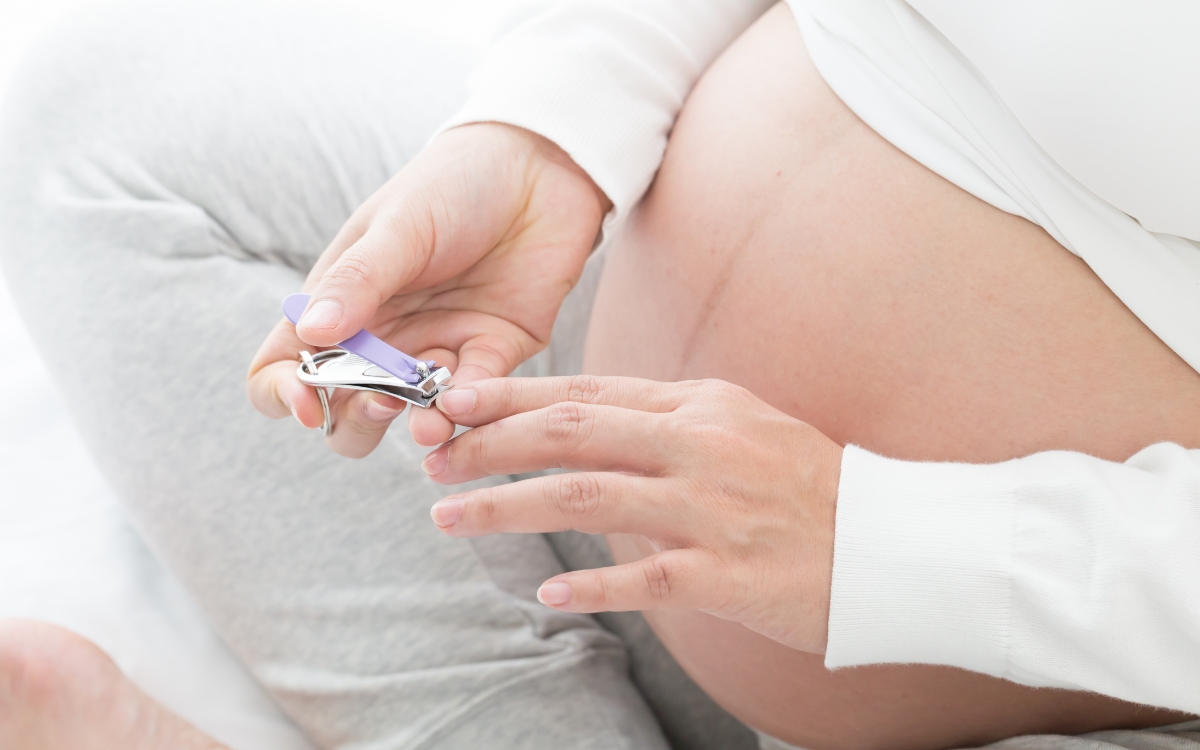Pregnancy is a beautiful and transformative time in a woman’s life. However, along with the joy and anticipation, it also brings about numerous changes in the body, thanks to the surge of hormones coursing through the system. While most women are aware of the common physical changes during pregnancy, such as weight gain and morning sickness, many may not realize that these hormonal shifts can also affect the health and appearance of their nails.

Understanding and caring for your nails during this time is essential to maintain their strength and beauty. In this blog post, we will delve into the impact of pregnancy-induced hormonal changes on nails and provide practical tips to help you keep them healthy and well-nourished throughout your pregnancy journey.
Understanding Hormonal Changes during Pregnancy
Hormonal changes play a crucial role in pregnancy, orchestrating various physiological transformations in a woman’s body to support the growth and development of the baby. These hormonal fluctuations affect not only the internal systems but also manifest in external changes, including the health and appearance of nails. By understanding the mechanisms behind these hormonal changes, expectant mothers can gain insight into how their nails may be impacted during pregnancy.
The Role of Hormones in Pregnancy
During pregnancy, a remarkable symphony of hormonal changes takes place within a woman’s body. These hormones serve as messengers, orchestrating the complex processes necessary for nurturing and sustaining the developing fetus.
Understanding the role of hormones in pregnancy is essential to comprehend the wide-ranging effects they have on various bodily systems, including the health and condition of nails.
Estrogen: The Key Player
One of the primary hormones that undergoes significant changes during pregnancy is estrogen. Estrogen levels rise steadily throughout pregnancy, reaching their peak during the third trimester. This hormone plays a crucial role in supporting the growth and development of the fetus, as well as preparing the body for childbirth and breastfeeding.
Blood Flow and Nutrient Delivery
Estrogen, along with other hormones, contributes to an increase in blood flow throughout the body, including the tiny blood vessels in the fingertips and nail beds. This heightened circulation ensures a sufficient supply of oxygen and essential nutrients to the developing baby.
However, the increased blood flow can also influence the health and vitality of the nails by enhancing their access to nourishment.
Collagen Production and Nail Growth
Estrogen stimulates collagen synthesis, a vital protein responsible for maintaining the structural integrity and strength of various tissues, including the nails. Collagen contributes to the growth and overall health of nails, providing them with the necessary building blocks for optimal development. The surge in estrogen during pregnancy can, therefore, promote nail growth and contribute to their natural strength.
Increased Vascularization and Nail Bed Health
Another effect of hormonal changes, particularly the rise in estrogen levels, is increased vascularization, which refers to the growth of blood vessels. The nail beds become more vascularized, meaning they have a richer blood supply. This enhanced blood flow delivers essential nutrients to the nail matrix, where new cells are formed, thereby supporting the healthy growth of nails.
Pigment Changes and Nail Color
Hormonal fluctuations during pregnancy can also influence the pigmentation of nails. Some women may experience changes in nail color, such as darkening or the appearance of vertical streaks. These pigment alterations are primarily attributed to hormonal imbalances and increased melanin production, the pigment responsible for skin, hair, and nail coloration.
Sebaceous Glands and Nail Moisture
Sebaceous glands, which produce oil, are influenced by hormonal changes during pregnancy. While the sebaceous glands become more active in some areas of the body, such as the face, they may become less active in the nail area. This can result in reduced oil production and contribute to dryness or decreased moisture retention in the nails.
Hormonal Fluctuations and Nail Effects
The hormonal changes experienced during pregnancy can have notable effects on the health and appearance of nails. Understanding these fluctuations and their implications can help expectant mothers better manage and care for their nails during this transformative period.
Brittle Nails
One of the most common nail issues caused by hormonal changes during pregnancy is brittle nails. Hormonal imbalances, particularly the increase in progesterone levels, can lead to decreased moisture retention in the nails. As a result, the nails become dry, fragile, and more prone to breakage. Brittle nails can be frustrating and make simple daily tasks, such as buttoning clothes or opening packages, more challenging.
Nail Dryness
Alongside brittleness, hormonal fluctuations can also contribute to nail dryness. Estrogen, a key hormone during pregnancy, affects the natural oil production in the body, including the nails and surrounding skin. Reduced oil production can result in dry, dehydrated nails that lack the necessary flexibility and resilience. Dryness further exacerbates the problem of brittle nails, making them more susceptible to cracks and splits.
Read This Next:
Slow Nail Growth
Hormonal changes can also impact the rate of nail growth during pregnancy. While some women may experience faster nail growth due to increased blood flow and nutrient delivery, others may notice a slower growth rate.
Hormones influence the cell turnover rate in the nails, affecting the speed at which new cells are produced and nails grow. Understanding and accepting these changes can help manage expectations regarding nail length and growth during pregnancy.
Changes in Nail Thickness
Hormonal fluctuations can also influence the thickness of the nails. Some women may notice that their nails become thicker during pregnancy, while others may experience the opposite effect. The exact cause of these thickness changes is not fully understood, but it is believed to be related to the altered blood flow and increased collagen production associated with hormonal shifts. Monitoring changes in nail thickness can be useful for identifying and addressing potential nail health concerns.
Nail Discoloration
Hormonal changes may also contribute to nail discoloration during pregnancy. Some women may notice changes in the color of their nails, such as a yellowish or brownish tint. This discoloration can occur due to a variety of factors, including hormonal imbalances, nutrient deficiencies, or even increased blood volume during pregnancy. While mild discoloration is usually harmless, severe or persistent changes in nail color should be evaluated by a healthcare professional.
Nutritional Tips for Healthy Pregnancy Nails
Proper nutrition is paramount during pregnancy, not only for the well-being of the developing baby but also for the overall health of the mother. When it comes to maintaining healthy nails during pregnancy, a well-balanced diet rich in essential nutrients is essential.
Certain vitamins, minerals, and nutrients play a crucial role in promoting strong, resilient nails. Consider incorporating the following nutritional tips into your diet to support healthy pregnancy nails.
Iron: The Vital Nutrient for Strong Nails
Iron is an essential mineral that plays a crucial role in the production of red blood cells and oxygen transport throughout the body. Adequate iron levels are necessary for promoting nail strength and preventing brittleness.
Include iron-rich foods in your diet, such as lean red meat, poultry, fish, spinach, legumes, and fortified cereals. If necessary, consult your healthcare provider to ensure you are meeting your iron requirements through diet or supplements.
Biotin: The B-Vitamin That Promotes Nail Health
Biotin, also known as vitamin B7, is often recommended for supporting healthy hair, skin, and nails. This water-soluble vitamin aids in the production of keratin, the protein that forms the structural component of nails.
To boost biotin intake, include foods like eggs, nuts, seeds, whole grains, salmon, and sweet potatoes in your diet. However, it’s important to note that while biotin supplementation is commonly used for hair and nail health, consulting with your healthcare provider before starting any supplements during pregnancy is advised.
Omega-3 Fatty Acids: Nourishing Nails from Within
Omega-3 fatty acids, particularly DHA (docosahexaenoic acid), are essential fats that offer numerous benefits for both the baby’s development and maternal health. These healthy fats can also contribute to nail health by promoting moisture retention and reducing inflammation.
Incorporate omega-3-rich foods like fatty fish (such as salmon, sardines, and mackerel), chia seeds, flaxseeds, and walnuts into your diet. If you have dietary restrictions or concerns, consult your healthcare provider for guidance on omega-3 supplementation.
Hydration: The Foundation of Nail Health
Staying adequately hydrated is vital for overall health, and it also benefits nail health. Drinking plenty of water helps maintain proper moisture balance in the body, including the nails.
Dehydration can lead to dryness, making nails more susceptible to brittleness and breakage. Aim to drink at least eight glasses of water daily, and hydrate with other fluids like herbal teas, infused water, or fruit juices to meet your fluid needs.
Balanced Diet: A Comprehensive Approach to Nail Health
While specific nutrients are essential for healthy pregnancy nails, maintaining a well-balanced diet is crucial for overall well-being. Include a variety of fruits, vegetables, whole grains, lean proteins, and healthy fats in your daily meals. Opt for colorful produce that is rich in vitamins, minerals, and antioxidants to support optimal nail health and overall pregnancy nutrition.
Conclusion
As you embark on the incredible journey of pregnancy, it’s important to pay attention to every aspect of your well-being, including the health of your nails. The hormonal changes that occur during this time can have a significant impact on your nails, leading to brittleness, breakage, and other common issues. However, armed with the knowledge and practical tips shared in this blog post, you can take proactive steps to care for your nails and keep them in optimal condition.









